Five UArizona College of Pharmacy Researchers Win TRIF Funding for Projects to Fight COVID-19
The funds – administered by the Arizona Board of Regents and University of Arizona BIO5 Institute – enable researchers to combat the global pandemic and positively impact the health of Arizonans.
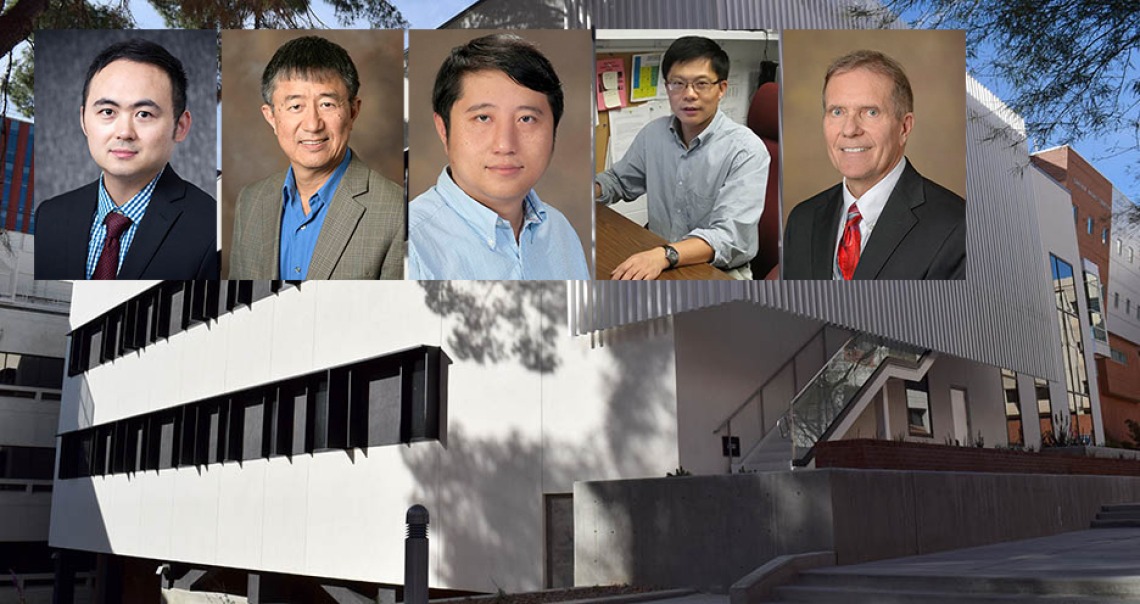
TUCSON, Ariz. – Several initiatives of University of Arizona College of Pharmacy faculty members have been funded as part of more than $500,000 awarded to UArizona research teams to “jump-start” projects to fight COVID-19.
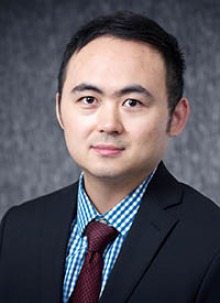
Jianqin Lu, BPharm, PhD
The UArizona BIO5 Institute, which connects hundreds of researchers in different disciplines across the UArizona campuses to address complex challenges, has responded to the pandemic by releasing a round of seed funding through the Technology and Research Initiative Fund (TRIF), which is administered by the Arizona Board of Regents. The fund enables researchers to positively impact Arizonans’ health and combat the global pandemic.
The five College of Pharmacy researchers among the 13 interdisciplinary groups funded through the program are: Jianqin Lu, BPharm, PhD, assistant professor; Xinxin Ding, PhD, head of the Department of Pharmacology and Toxicology; Yin Chen, PhD, associate professor; Wei Wang, PhD, professor and co-director of the Arizona Center for Drug Discovery; and Brian Erstad, PharmD, head of the Department of Pharmacy Practice and Science. These scientists are addressing the pandemic from multiple angles.
“Our faculty members bring a wealth of knowledge to the table and are primed to assist in the effort to improve the health outcomes of patients facing the effects of COVID-19,” said Rick Schnellmann, PhD, dean of the UArizona College of Pharmacy. “This talented group of researchers understands the importance to identify innovative approaches to address this unique public-health crisis.”
Enhancing Efficacy: Drs. Jianqin Lu and Xinxin Ding
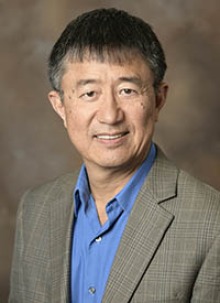
Xinxin Ding, PhD
Two anti-malarial drugs, chloroquine and hydroxychloroquine, have shown promise against COVID-19 in clinical studies. Their use, however, is associated with serious safety concerns and large variations in effectiveness. Drs. Lu and Ding aim to use “nanotechnology” to improve delivery, enhance efficacy and minimize the toxicity of these drugs.
“These drugs are mechanistically sound. The key to success is to strike a good balance between the benefits and the potential risks,” Dr. Ding explained. “The current versions of these drugs have too many adverse effects, which makes it difficult to show the benefits. We are hoping that the nano-drug delivery formulation, in which nanoparticles are used for the delivery and release of a drug in the body, will improve that balance by reducing risk and enhancing benefits.”
Immune Response: Dr. Jianqin Lu and Dr. Yin Chen
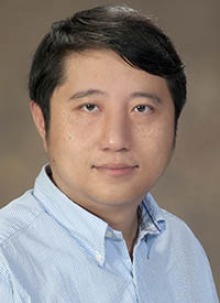
Yin Chen, PhD
Dr. Lu also has joined forces with Dr. Chen to investigate whether immune system activation can treat COVID-19 patients instead of directly targeting the virus. The team’s goal is to produce a new interferon-based drug, which focuses on molecules found in the body named for their ability to “interfere” with the viral replication cycle, in which a virus makes copies of itself causing a viral infection. The potential of this treatment method could go far beyond COVID-19.
“If we succeed, we will be close to the development of a universal treatment for many viral illnesses including COVID-19, influenza, etc.,” Dr. Chen said.
Novel Compounds: Dr. Wei Wang
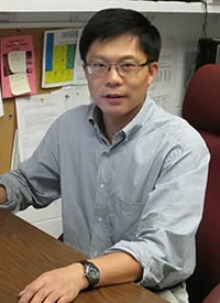
Wei Wang, PhD
Because clinical studies of chloroquine and hydroxychloroquine have provided uncertain evidence regarding their usefulness, Dr. Wang has teamed up with two associate professors of medicine, Steffan Nawrocki, PhD, and Jennifer Carew, PhD, with the UArizona Cancer Center to design similar, yet distinct compounds using the two anti-malarial drugs as a foundation. This team of experts aims to develop compounds that are safer and more effective.
“Our team, comprised of experts in cell regeneration, experimental therapeutics, drug discovery and coronavirus biology, is ideally positioned to address this critically unmet medical need,” Dr. Wang said.
COVID-19 Clinical Registry: Dr. Brian Erstad
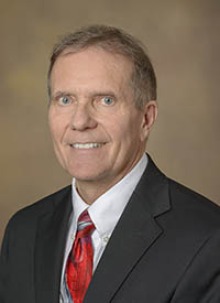
Brian Erstad, PharmD
Dr. Erstad, with Karen Lutrick, PhD, of the College of Medicine – Tucson, and Dean Billheimer, PhD, of the Mel and Enid Zuckerman College of Public Health and Center for Biomedical Informatics and Biostatistics, have developed a project using patient data from Banner – University Medical Center Tucson and area family medical clinics to create a real-time, COVID-19 database that will allow for a better understanding of the impact of the pandemic on local health systems.
“The database will provide information on diagnosis, disease progression, treatments and outcomes for our local community,” Dr. Erstad said. “And it will provide the framework for future funding related to pandemic preparedness.”
TRIF Funds
TRIF was established through Proposition 301, approved by Arizona taxpayers in November 2000 to raise the Arizona sales tax by 0.6%. Revenue generated through this mechanism is vital to supporting university research and innovation, in addition to K-12 education and community college workforce programs.
In response to the pandemic, TRIF funds were quickly allocated to create a COVID-19 seed grant program. Proposals for interdisciplinary basic science, technology, clinical or population research that directly address COVID-19 were accepted from university teams of two or more researchers.
Projects were awarded based on three criteria: the potential to make an immediate COVID-19 impact, collaboration and teamwork of the applicants, and use of university core facilities in addressing research questions. Of the 55 seed grant applicants, 13 interdisciplinary groups were funded, representing seven UArizona colleges. With funds to support technical staff, postdoctoral researchers, graduate students and resources to perform analyses, researchers will address the novel coronavirus from multiple angles.
# # #
Click here for UArizona BIO5 Institute COVID-19 information.
The UArizona Health Sciences COVID-19 Resources webpage can be found here.
For the latest on the University of Arizona response to the novel coronavirus, visit the university's COVID-19 webpage.
For UANews coverage of COVID-19, see this link.
NOTE: Photos available upon request.
About the University of Arizona College of Pharmacy
The University of Arizona College of Pharmacy is the premier pharmacy college in the Southwest, and one of the top in the nation, focused on drug discovery, toxicology, pharmaceutics, health outcomes and sciences, pharmaceutical education and research through interprofessional training and collaborative public/private partnerships. Preparing pharmacists and pharmaceutical scientists in undergraduate, professional, graduate and post-doctoral programs, the college embraces an entrepreneurial spirit, providing tailored educational opportunities to broaden students' experiences. Established 72 years ago as the first health sciences college at UArizona, the college has a long history of improving science and health, both in Arizona and around the world. It is currently ranked No. 8 among the nation’s 143 colleges of pharmacy by the American Association of Colleges of Pharmacy. For more information: pharmacy.arizona.edu (Follow us: Facebook | Twitter | Instagram | YouTube).
About the University of Arizona Health Sciences
The University of Arizona Health Sciences is the statewide leader in biomedical research and health professions training. UArizona Health Sciences includes the Colleges of Medicine (Tucson and Phoenix), Nursing, Pharmacy, and the Mel and Enid Zuckerman College of Public Health, with main campus locations in Tucson and the Phoenix Biomedical Campus in downtown Phoenix. From these vantage points, Health Sciences reaches across the state of Arizona, the greater Southwest and around the world to provide next-generation education, research and outreach. A major economic engine, Health Sciences employs nearly 5,000 people, has approximately 4,000 students and 900 faculty members, and garners $200 million in research grants and contracts annually. For more information: uahs.arizona.edu (Follow us: Facebook | Twitter | YouTube | LinkedIn | Instagram).

